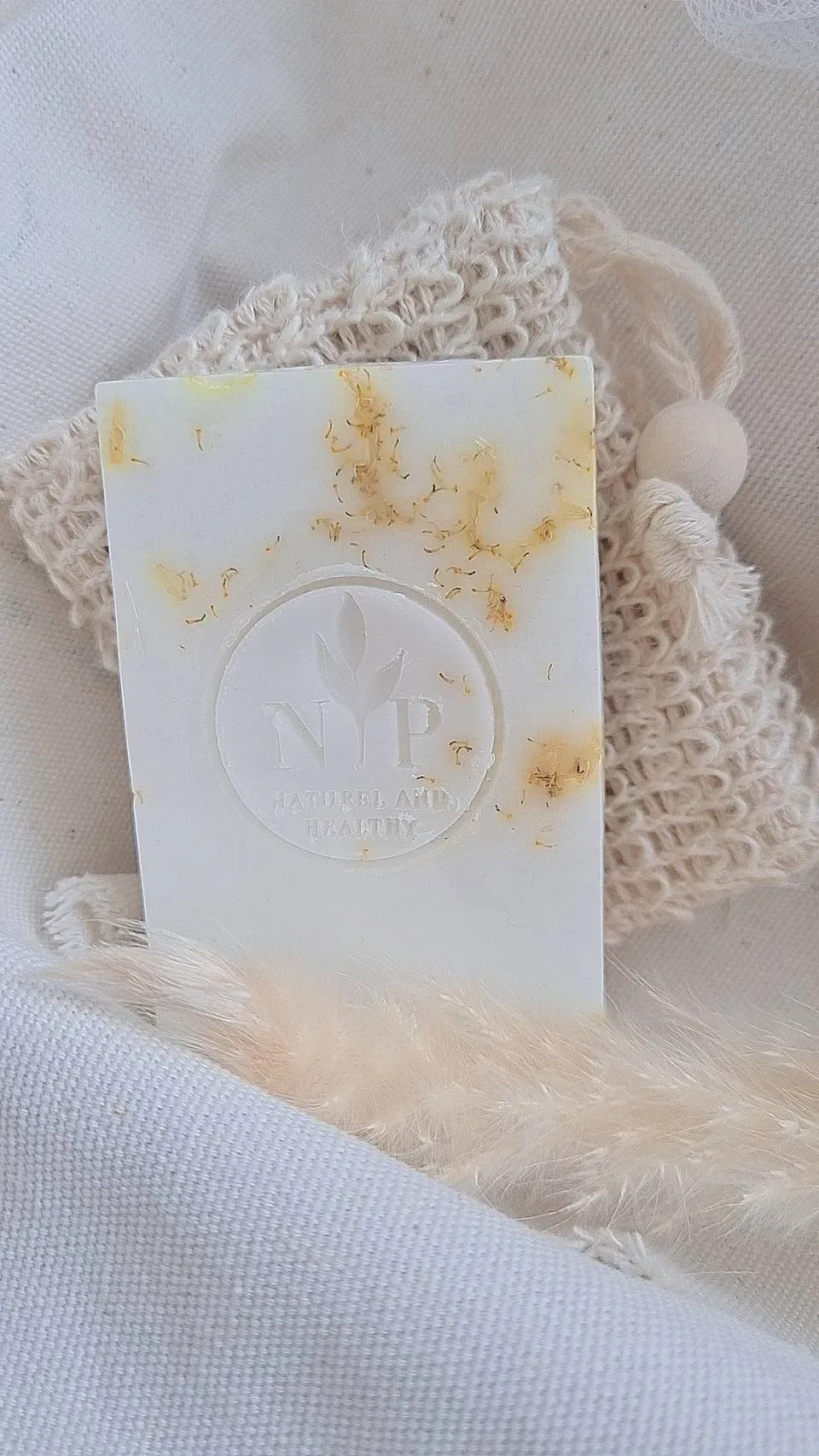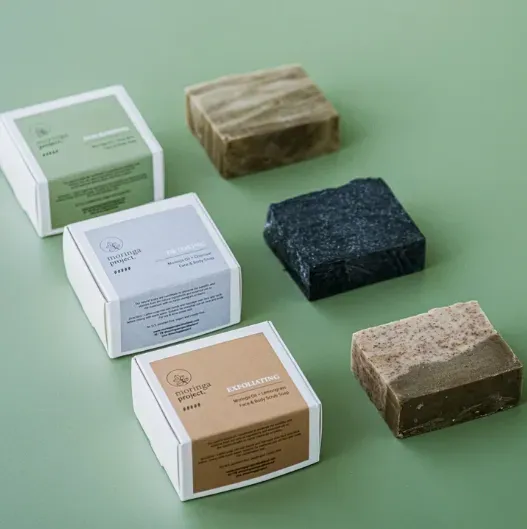Benefits of Using Natural Handmade Soaps Over Commercial Soaps
In today's conscious world, the importance of using skin-friendly and chemical-free products has grown significantly. One such essential item is soap, which we use daily. But are we making the right choice? The debate between handmade soap vs commercial soap is ongoing, but evidence shows that natural handmade soaps offer numerous advantages over mass-produced options.
Let’s explore why switching to herbal soap or organic soap can transform your skincare routine and overall well-being.
1. Gentle on the Skin

Unlike commercial soaps loaded with synthetic detergents, parabens, and sulfates, natural handmade soaps are crafted using skin-loving oils and butters. These ingredients, such as coconut oil, olive oil, and shea butter, cleanse the skin without stripping its natural moisture barrier.
If you have sensitive skin, switching to handcrafted soap for sensitive skin can reduce irritation, dryness, and redness. This makes it ideal for those prone to eczema, psoriasis, or acne.
Try HappyLyfe’s Cucumber & Aloe Vera Soap, specially formulated to soothe sensitive skin with cooling, plant-based ingredients.
Also Read: Why Organic Skincare Products are Beneficial?
2. Free from Harmful Chemicals
One of the biggest benefits of handmade soap is the absence of harsh chemicals. Commercial soaps often include artificial fragrances, colors, and preservatives that can harm your skin and health.
On the other hand, natural handmade soap is free from toxins, offering a chemical-free soap alternative that is safe for all skin types. These soaps use essential oils, clays, herbs, and botanical extracts to provide fragrance and color naturally.
3. Packed with Natural Ingredients
Natural handmade soaps are typically enriched with vitamins, minerals, and antioxidants derived from nature. These nutrients nourish the skin, improve elasticity, and help reduce signs of aging.
Ingredients like lavender, turmeric, and green tea are commonly used in handmade soaps to enhance their skincare benefits.
For example, HappyLyfe’s Green Tea & Lime Soap is loaded with antioxidants that help fight free radicals and prevent premature aging.
4. Superior Moisturizing Properties
Handmade soaps retain glycerin, a natural humectant that draws moisture to the skin. During the commercial soap-making process, glycerin is often removed and sold separately, leaving the soap harsh and drying.
The presence of glycerin in handcrafted soap ensures the skin remains soft, smooth, and hydrated after every wash.
Looking for the best handmade soap for skin hydration? Try HappyLyfe’s Watermelon Soap, infused with moisturizing oils and fruit extracts.
5. Environmentally Friendly and Sustainable

Choosing natural handmade soap supports sustainable skincare products. These soaps are biodegradable, use minimal or recyclable packaging, and are usually made in small batches to reduce environmental impact.
Most commercial soaps, on the other hand, contribute to pollution due to synthetic ingredients and plastic packaging.
Brands like HappyLyfe emphasize eco-conscious production, offering options like Lemongrass Soap, which is both skin-friendly and environmentally responsible.
6. Rich Aromatherapy Benefits
Handmade soaps are often infused with pure essential oils, providing natural and therapeutic fragrances. Unlike synthetic scents found in commercial soaps, essential oils offer aromatherapy benefits such as stress relief, mental clarity, and relaxation.
For instance, HappyLyfe’s Rosemary Soap not only cleanses the skin but also invigorates the senses with its refreshing herbal aroma.
Also Read: Vegan, Natural, Organic & Cruelty-Free Skincare: What’s the Difference?
7. Customization and Unique Formulations
One of the major benefits of handmade soap is the variety available to suit different skin types and preferences. Whether you need exfoliating, soothing, or anti-acne formulations, you can find a herbal soap tailored to your needs.
For those who enjoy traditional skincare remedies, HappyLyfe’s Ayurvedic 4 in 1 Luxury Soap blends ancient herbal wisdom with modern soap-making artistry for a truly holistic bathing experience.
8. Supporting Local Artisans and Small Businesses
When you choose handcrafted soap, you are often supporting small businesses or local artisans who are passionate about creating quality skincare products. This helps promote ethical trade and sustains craftsmanship, unlike mass-market commercial soaps produced by large corporations.
By purchasing soaps from brands like HappyLyfe, you contribute to a sustainable economy and receive thoughtfully made, high-quality products.
Handmade Soap vs Commercial Soap: A Quick Comparison
Factors | Natural Handmade Soaps | Commercial Soaps |
Ingredients | Plant-based, organic, herbal | Synthetic chemicals, detergents |
Skin Benefits | Moisturizing, nourishing, gentle | Can be drying and irritating |
Environmental Impact | Eco-friendly, biodegradable | Often harmful to environment |
Customization | High variety for specific needs | Limited customization |
Health Impact | Free from toxins and allergens | May contain harmful additives |
Conclusion: Make the Switch for Healthier Skin
With all the benefits of handmade soap, it’s clear that these products are superior to their commercial counterparts. They provide a gentle, nourishing cleanse while protecting your skin and the environment.
Whether you choose the refreshing Green Tea & Lime Soap, the cooling Cucumber & Aloe Vera Soap, or the exotic Ayurvedic 4 in 1 Luxury Soap, your skin will thank you for making the natural switch.
Explore more options at HappyLyfe and transform your daily routine into a luxurious, mindful ritual.
Also Read: 10 Best Organic Skincare Products in 2025: HappyLyfe’s Thailand Favorites
Frequently Asked Questions (FAQs)
1. Why Should I Choose Natural Handmade Soaps Over Commercial Soaps?
Natural handmade soaps are free from harmful chemicals and synthetic additives, making them gentler and safer for your skin compared to commercial soaps.
2. Are Handmade Soaps Suitable For Sensitive Skin?
Yes, many handcrafted soaps for sensitive skin are made with mild, plant-based ingredients designed to soothe and protect delicate skin.
3. What Are The Main Ingredients In Natural Handmade Soap?
These soaps typically include essential oils, natural butters (like shea or cocoa butter), glycerine, herbal extracts, and botanical oils like olive or coconut oil.
4. Is Handmade Soap Better For The Environment?
Absolutely! Natural handmade soaps are biodegradable and usually come with eco-friendly packaging, supporting sustainable skincare products.
5. Does Handmade Soap Provide Enough Moisturizing Benefits?
Yes, handmade soaps retain glycerine, which locks moisture into the skin, making them one of the best handmade soaps for skin hydration.
6. Can I Use Natural Handmade Soap On My Face?
Many natural handmade soaps are gentle enough for facial use, especially those labelled as skin-friendly soap or designed for sensitive areas.
7. How Long Does Handmade Soap Last Compared To Commercial Soap?
Handmade soaps can last as long as commercial ones if stored properly in a dry place. Avoid letting them sit in water to extend their lifespan.
8. Are There Any Scented Options Available In Handmade Soaps?
Yes! You can enjoy wonderful natural scents like lemongrass, rosemary, and green tea in options such as HappyLyfe’s Lemongrass Soap and Rosemary Soap.

 English
English
 Thai
Thai